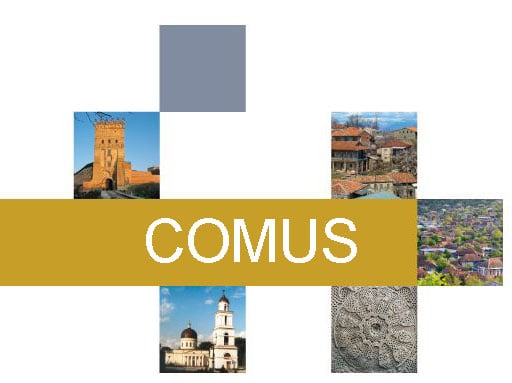COMUS Process

 New forms of governance such as transparent cross-sectorial work within the local administration, people-based approaches and community dialogue, and better horizontal and vertical coordination is stimulated through a variety of target-specific activities.
New forms of governance such as transparent cross-sectorial work within the local administration, people-based approaches and community dialogue, and better horizontal and vertical coordination is stimulated through a variety of target-specific activities.
Implemented in nine pilot towns which have been selected by the Ministries of Culture in Armenia, Belarus, Georgia, Republic of Moldova and Ukraine, COMUS activities are organised in four main phases:
- The “inception phase”, which is necessary for explaining the objectives of the project, identifying and mobilising the different partners, setting up the management structures and providing local staff with the required skills and competencies to use the methodology;
- The “planning phase”, during which national stakeholders and communities will debate and decide on shared objectives for the future development of each of the pilot towns and decide on the priority interventions to form the planning instruments;
- The “project phase”, during which bankable projects targeting the rehabilitation of monuments, buildings or sites will be elaborated through technical documents to be used for the promotion of the projects (to secure investment);
- The “consolidation phase” which will enable municipalities and national authorities involved in COMUS to take stock of the experience, learn about the experimentation, and elaborate decisions to be taken at national level regarding the relevant adaptation of policies and strategies.
Project-based oriented Local reference plans will be elaborated through a constant concern for dialogue and participation of stakeholders at all stages of the process devoted to building a common vision of the future. The process is made for facilitating the identification of medium- and long-term priority interventions (related to housing, local production, welcoming of visitors, cultural and educational development, etc.) which together, could trigger regeneration dynamics and sustainably change the face of the pilot towns.
“Rehabilitation” projects will mobilise partners and create synergies in terms of means and resources, building confidence amongst inhabitants, and stimulating local dynamics on the town scale. Technical documents, drawn up in reference to the best European practices and designed to provide relevant information for investors, will develop the capacity and credibility of target groups to present bankable projects and will stimulate national and international funding sources, with a particular focus on encouraging future public and private partnerships.








